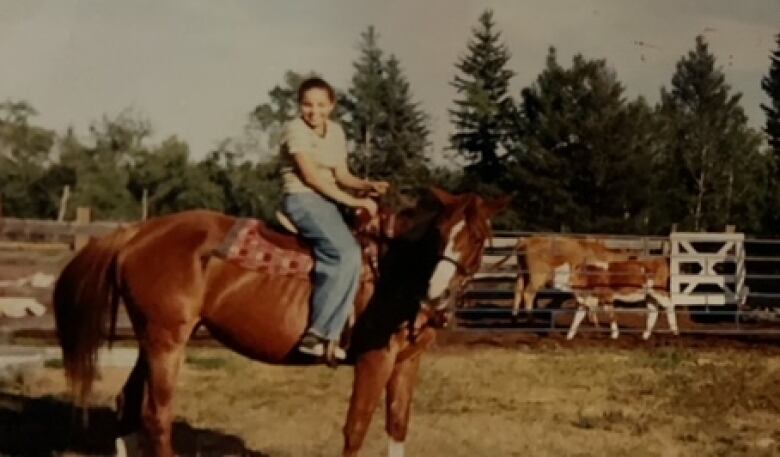Candice Wheeler's heart hurts when she learns that she missed her sister's funeral in January. She didn't want her to be there — she simply didn't know it was happening.
Currently, Calgary's Candice and her family respond to how Courtney Wheeler died in December 2021 and authorities did not notify him when he was buried the following month. I'm looking for.
"There were no flowers there ... and that means no one cares," Wheeler said.

In most cases, if a person dies unidentified or unclaimed, the chief coroner's office will identify close relatives within hours. You can find it. To tell.
Otherwise, the state says the office will continue to search until all efforts have been "exhausted."
However, Wheelers said he didn't know about Courtney's death until a few months after it happened, yet he didn't get any news from the authorities. Instead, they found out she was going through social media.
So I was wondering how enthusiastic the search for Courtney's close relatives was.
In Calgary, I'm particularly concerned because it seems to be the second similar incident in just a few months. In February,Tara Niptanatiakdied and was buried in the city the following month, unknown to her family in Cambridge Bay, Nunavut.
"Who makes this possible," said Courtney's sister, Chrissy Wheeler, 44.
Her family learned of her death through Facebook
When Candice Wheeler first learned of Courtney's death, since she was last contacted by her sister It's been a few months.
This was not unprecedented. A few years before her death, Courtney suffered from an addiction to escalate with the homeless, and she was known to be off the map for weeks or months before she resurfaced.
But in late May, Candice learned about her death after another friend encountered a brief online obituary posted by the funeral home that arranged the burial. I received a Facebook message from a friend of 144}. ..
Worried, Candice called the police non-emergency phone number. She was redirected to the chief coroner's office and confirmed the death of her sister.
Candice said she was told she was obviously smoking when she both Courtney and her friend fell asleep. Her friend woke up. She didn't do Courtney.
Candice also said she had been searching Courtney's relatives for a month before her case was handed over to the offices of public guardians and her relatives. She said she was. The office works with a local funeral hall to arrange burials for those who cannot find her family.
But Wheeler says it shouldn't be too difficult to find.
'Why didn't the officials do that because a stranger found us?
Candice, Clichy and her mother, Marie, all share a surname. They live in the same city and haven't moved or changed their phone numbers for years.
Candice believes she had stored her information in a file from a past missing person report filed by police with her sister in 2019 (at that time Courtney shortly thereafter). Was placed). Courtney is known at Calgary's addiction treatment facility, and Marie's information should have been recorded as the contact information for her her family .
All three women were also listed as members of her family on Courtney's Facebook page. This is how Courtney's friend first caught the woman.
"I found a stranger we didn't know told us that she had died," Clichy said. "If a stranger could find us, why didn't the police find us, or the [person]?"
In a question from CBC Calgary In response, Calgary Police Services said that privacy law does not allow comments on certain non-criminal cases.
According to the service, if the Calgary police die, it is generally the office of the chief coroner to identify and identify close relatives with police and other assistance. It is the authority of the place. Organization.

Privacy Act (submitted by Candice Wheeler) also requires the chief coroner's office and public guardians and commissions to disclose information about a particular case to the media. It is restricted to the office of the person. Ministry of Justice and Solicitor General.
In a statement, a spokesperson said that the coroner's office worked with police, RCMP, government and non-governmental organizations to identify close relatives and make every effort. Said to search until needed. "I'm exhausted."
"Unfortunately, especially if the deceased does not have an ID, the family is estranged, the name has been changed, or the family lives in another jurisdiction in Canada. Especially when it is not always possible to find a family in a timely manner, or internationally, "said spokesman Catherine Thompson.
Thompson said the ministry is looking for ways to improve the process of identifying close relatives, including establishing agreements with other Canadian jurisdictions.

'Someone cares'
Wheelers say the state process for finding close relatives sounds good. say. They just don't believe it followed in their case.
And the family wants to know more about how the search was developed and the authorities couldn't find them, but they may already know. I suspect it isn't there.
Candice Wheeler said she was lazy because Courtney was stereotyped as a homeless indigenous woman and authorities thought no one cares about her. She believes
"In fact, someone was concerned," she said. "We want to make sure they know it now."
They hope that by sharing their story, this situation can never happen again. I'm out. Candice said the problem wasn't unique to Alberta. In 2020, a Toronto man, Seth MacLean, died of an overdose in a shelter, and while his family was desperately looking for him, nearby pickering Was buried in.
"It's happening too much. The family is deprived of the ability to say goodbye to loved ones," Candice said.
Ever since knowing Courtney's death, the Wheelers have hosted a small memorial service to say goodbye. It helped a bit, but they still say there is a lot of pain.
"With all these unanswered questions, it's difficult to proceed with grief normally," Clichy said.



